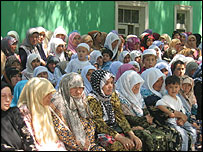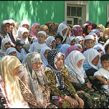
MASSES REJECT CHARGES OF ISLAMIC EXTREMISM IN UZBEKISTAN
Publication: Eurasia Daily Monitor Volume: 2 Issue: 94
By:

Early this morning thousands of residents took to the streets of Andijan, Uzbekistan, to protest a show trial of alleged Islamic extremists. Initial reports say that nine people are dead and Uzbek President Islam Karimov is on his way to the city. Reportedly demonstrators stormed the local prison, setting the inmates free.
The protests began peacefully on Wednesday, April 11. Hundreds of Andijan residents demonstrated on behalf of 23 young men accused of being affiliated with the outlawed Islamic group “Akramiya.” Andijan is located in Uzbekistan’s Fergana Valley near the border with Kyrgyzstan. Wednesday’s protest was calm and quite well organized. Participants dressed in their best clothes and came prepared with food supplies. Women were lined up on one side of the street, while the men were standing on the other. Long benches were set up so that women could sit during the rally.
Security personnel, including one person armed with a video camera to discourage possible attacks by police, accompanied the crowd of demonstrators. While police cruisers occasionally patrolled the area, the officers did not interfere with the demonstration. Trials of Islamist extremists in this area are frequently accompanied by protests, but Andijan is the largest demonstration to date (Fergana.ru, May 10).
The 23 men were arrested during summer 2004 and their trial began in February 2005. All of the defendants are successful young businessmen suspected of being members of the Islamic movement Akramiya, which the government claims was established by Akram Yuldashev. In 1992 Yuldashev, a mathematics teacher from Andijan, wrote a brief theological tract titled, “Iymonga iyul” (The path to faith). The brochure did not address political questions, instead focusing on general topics of contemporary morality. In the context of this discussion, Yuldashev sought to demonstrate the superiority of the Islamic worldview.
Yuldashev soon attracted a circle of followers who had read his pamphlet and wanted to adhere to Islamic norms in their everyday lives. In April 1998 Yuldashev was sentenced to prison for two years and six months on trumped-up charges of drug possession. He was released as part of the December 1998 amnesty only to be arrested again following explosions in downtown Tashkent in February 1999. This time he was sentenced to 17 years in prison.
The court ruling, which was based on no factual evidence, accused Yuldashev of organizing the explosions in Tashkent. He was also accused of establishing the “religious-extremist organization ‘Akramiya,’ ” which allegedly sought to create an Islamic state in Uzbekistan. The court derived the name “Akramiya” from Yuldashev’s first name. According to the court’s verdict, Yuldashev’s brochure calls for a changing the constitutional order in Uzbekistan, seizing power, and ousting the legitimately elected and appointed state representatives.
Contrary to the authorities’ charges, Yuldashev has repeatedly emphasized his disinterest in politics. He has never called for the creation of an Islamic state. According to Bakhrom Shakirov, the father of one of the arrested men and himself a former member of Akramiya, Yuldashev’s main idea is that if every Muslim sought his or her personal perfection, then the world will gradually change for the better (Forum18.org, February 14).
The press often mistakenly reports that Akramiya is a faction of the radical Islamic group Hizb-ut-Tahrir, which aims at unifying the Muslims of the world into a single Caliphate (Fergana.ru, May 10). At the same time, the press attributes even more radical ideas to Akramiya than to Hizb-ut-Tahrir. For example, in an article posted at Eurasianet.org, Alisher Khamidov maintains, “In the brochure ‘Iymonga iyul’ (‘The path to the faith’) Yuldashev asserted that the non-violent methods of ‘Hizb-ut-Tahrir’ were developed for the Arab states and are irrelevant in the conditions of Central Asia. Unlike ‘Hizb-ut-Tahrir,’ Yuldashev thought that the Islamic organization should seize power” (Eurasianet.org, October 23, 2003). However, the Russian translation of the brochure, which centrasia.ru published on August 25, 2004, clearly shows that Yuldashev is not calling for a violent seizure of power. Yuldashev and his supporters deny any connections with Hizb-ut-Tahrir (centrasia.ru, August 25, 2004).
Muhammad Sadyk Muhammad Yusuf, the former Mufti of Uzbekistan and one of the leading theologians of Central Asia, also thinks that Akramiya is an organization that is far removed from politics. According to him, “Akramiya has nothing in common with Hizb-ut-Tahrir, and other radical political Islamic organizations.” “It is for entirely different reasons that I consider Akram Yuldashev’s teaching a heresy. Thus, for instance, he thinks that it is not necessary for a Muslim to pray five times a day and to fast during the month of Ramadan,” he told Jamestown.
The current tensions surrounding the extremists’ trial are also notable for at least two other reasons. First of all, the tensions demonstrate that, despite all the efforts by Tashkent, the Uzbek establishment has failed to stamp out alternative (i.e. not state controlled) forms of Islam. Second, despite the harsh repressive policy by the Uzbek authorities, the trials over Islamists are increasingly causing massive protest actions. As the fergana.ru website notes, the trials of Islamist extremists were accompanied by demonstrations in the past as well, but the Andijan protest action is certainly the largest protest to date (Fergana.ru, May 10).
Geographically Andijan is nearer Osh, Kyrgyzstan, than Tashkent. The Tulip Revolution that toppled the authoritarian regime in neighboring Kyrgyzstan had its earliest popular protests in Osh. Whether or not Osh and Andijan are politically and ideologically similar remains to be seen. But by flying to Andijan, President Karimov has indicated that he fears a repeat of the regime change scenario recently seen in Kyrgyzstan. In the ominous words of Valijon Atakhonjonov, brother of one of the accused men, “The people have risen” (AP, May 13).




